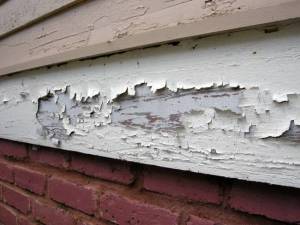If you have Sellers who are willing to accept FHA financing from Buyers, make sure you/they understand these two words…professional and workmanlike. The reason being, HUD requires that all repairs for FHA insured loans be completed in a professional and workmanlike manner. If they are not, the financing may be denied.
Now, I understand that most Sellers aren’t thrilled about making repairs to a house they plan on selling. Some Sellers figure if they do the bare minimum repairs everything will be fine. However, if the repairs are not completed in a professional and workmanlike manner the deal could fall through. Here’s a real life example of how not to complete required FHA repairs. In this case, the FHA guidelines required that the exterior of all of the windows be scraped, prepped and painted. The Seller (who balked at the idea) came up with his own solution.
Well, needless to say this didn’t pass the professional and workmanlike standards of HUD. The appraiser deemed the repairs unsatisfactory. As a result, the Seller had two options, make the repairs or lose the deal. As you can imagine, his paint job didn’t exactly add value or make his house more attractive to a new Buyer. Eventually, the Seller decided to make the proper repairs. He hired a professional painter (at his own expense, over $4,000) to complete the job in a professional and workmanlike manner. The repairs were then deemed satisfactory.
Bottom line, when it comes to FHA repairs it pays to do them correctly the first time. If a repair requirement is unclear, reach out to the lender or appraiser for clarification. Doing so can save time, money and the sale.
If you are working with a Seller and would like to address potential FHA repairs prior to listing, please contact our office. We have a service available to homeowners and agents where one of our professional, certified and FHA Approved appraisers will visit your property and work with you to identify potential FHA issues.
The Coyle Group’s team of Philadelphia appraisers is a leading provider of appraisals for Estate/Probate, Divorce, Bankruptcy, Tax Appeal and Pre-Listing appraisals in the greater Philadelphia Metro Area. If you need a guest speaker at your next sales meeting, please give us a call. We would welcome to opportunity to speak to your group and field any appraisal related questions you may have. For more information please visit our website at www.TheCoyleGroupLLC.com You can also contact The Coyle Group at 215-836-5500 or appraisals@coyleappraisals.com

















Latest Comments